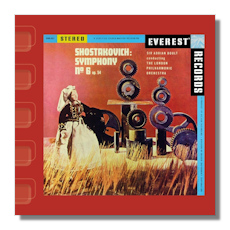
The Internet's Premier Classical Music Source
Related Links
- Shostakovich Reviews
- Latest Reviews
- More Reviews
-
By Composer
-
Collections
DVD & Blu-ray
Books
Concert Reviews
Articles/Interviews
Software
Audio
Search Amazon
Recommended Links
Site News
 CD Review
CD Review
Critics who are older and wiser than me have been grumping about the short playing times of these albums, never mind that they are much more practical and attractive in today's market. The likelihood of someone going to iTunes and shoving one work on their iThing is very likely indeed, making such short programs entirely worth it in that medium. Per Classical Net guidelines – not to mention my own personal preferences – this is a review of the physical disc available from Amazon, and while I'm not sure if anyone is looking for the Shostakovich Sixth alone, it's a very good disc.
Adrian Boult is not a name that comes to mind with this composer, but here he is. Arguably, his Vaughan Williams Ninth with these forces is more musically important. That said, this disc is more musically interesting. For one, it shows these forces fully capable of playing this music well, and shows Boult in an unusually excitable mood. I'm not entirely convinced by the whole thing – and that applies to the work as well as the performance – but as a document of a normally reserved partnership letting loose, it sure is fun to listen to.
The Philharmonic doesn't really dig in hard like the greatest Russian ensembles, but the first movement does feature some very satisfying and even harrowing moments. I'm impressed that Boult captures the idiom so faithfully. The strings are gutsy, the winds are tangy, the bass is full. I mean, this is as British as you could get in those days, so for a team that sometimes dropped the ball on more famous fare, the effort is appreciated. I do feel like there is even more lurking just below where the conductor is willing to go, but even so, the climaxes are really something. In the Allegro, Boult lets his hair down and conjures a darkly dancing and sardonic character that is totally atypical of this artist. While stiff in spots, you have to admire what goes right. The Everest sound is tremendous, and adds to the excitement.
This excitement carries successfully over to the Presto.So too does that occasionally stiffness; the opening bars especially are a touch wooden. But the movement improves as it goes along, whipping into a truly whirlwind set of climaxes. I certainly wouldn't guess Boult as the conductor if I was listening blindly, and it is nothing short of a pleasant surprise. Very fine first desk playing caps a very fine performance; not a reference perhaps, but a delight considering the source. Thanks to Countdown Media, Everest is truly back!
Copyright © 2014, Brian Wigman




















